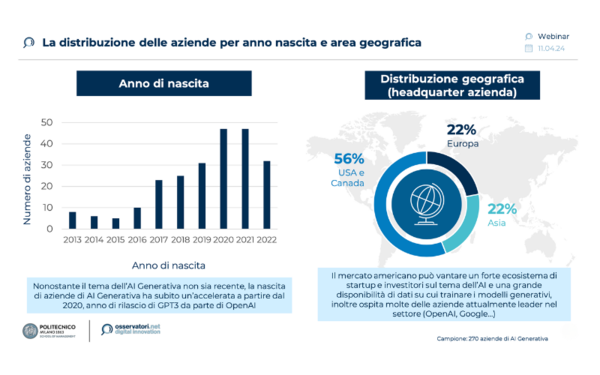Generative AI is revolutionizing the technological landscape, offering extraordinary opportunities for innovation and digital transformation in businesses. This article will explore how Generative AI is transforming various industrial sectors and what the main implications are for the future.
Generative AI refers to a type of artificial intelligence that uses advanced machine learning algorithms to generate new content, which can include text, images, video, and even computer code. This technology is based on AI models, known as foundation models, which have been trained on vast datasets to learn and replicate the distribution of probability of the observed data.
From the workshop "Not Just ChatGPT: The Essential Concepts and New Tools of Generative AI", conducted by the Artificial Intelligence Observatory, it emerged that Generative AI has revolutionary potential in numerous sectors. For example, in the automotive industry, this technology can accelerate vehicle design and the creation of synthetic data for training autonomous vehicles. In the banking sector, it can improve the generation of scenarios for market risk models and ensure data privacy compliance. Sectors such as design, education, e-commerce, entertainment, fashion, pharmaceuticals, and manufacturing can greatly benefit from integrating Generative AI into their daily operations, ranging from creating innovative designs to customizing the customer experience.
According to a census conducted in 2023, the field of Generative AI has seen significant expansion with over 270 companies identified. These companies have raised a total of $4 billion in funding, with an average startup funding of about $35 million. These investments indicate a clear confidence in the growth potential and impact of this technology. Companies focused on Generative AI have concentrated on various areas, from Extended Reality to the Metaverse, from Cloud transformation to Blockchain and Web 3.0, reflecting the variety and versatility of possible applications for this emerging technology.

The geographic distribution of Generative AI companies highlights a predominance of the United States and Canada, which together account for 56% of the companies surveyed, while Europe and Asia each hold 22%. This shows how North America continues to be a hub for innovation and development in the field of artificial intelligence, benefiting from a robust ecosystem of startups and investors. Although Generative AI technology is not new, the acceleration in the emergence of new companies in the sector has been remarkable since the release of GPT-3 by OpenAI in 2020.
Generative AI has been segmented into four main application areas: content creation, productivity, conversational artificial intelligence, and data and model creation. Each area sees a different percentage of involvement from companies: 40% of companies focus on content creation, 30% on productivity, 16% on conversational artificial intelligence, and 14% on data and model creation. This segmentation reflects how Generative AI can be adapted and implemented in various contexts to improve efficiency, stimulate innovation, and respond to specific business needs through customized solutions.
Numerous emerging companies have been identified as "unicorns" of Generative AI, i.e., companies that have reached market valuations over a billion dollars. For example, Lightricks in Israel has developed a photo editing app that incorporates generative AI for creating images from text, using the open-source code of Stable Diffusion. In the United States, Replit offers an integrated development environment that integrates an AI assistant, enhancing developer productivity. Anthropic, also in the USA, has created a proprietary language model called Claude, capable of performing a wide range of tasks, from content generation to programming. Finally, Hugging Face has made pre-trained models available that allow companies to customize and implement their own Generative AI solutions. These examples demonstrate the versatility and revolutionary potential of Generative AI in various contexts and sectors. These companies are developing solutions ranging from the creation of creative content, such as texts and images, to enhancing productivity through AI assistants for coding and drafting documents, to developing new structured data or models for training machine learning systems.
Despite the numerous opportunities, Generative AI also presents significant challenges, especially in terms of digital ethics, data privacy, and governance. Regulation plays a crucial role in ensuring that the use of this technology is fair, secure, and compliant with existing regulations.
Generative AI is a rapidly expanding technological frontier offering vast benefits in terms of innovation and efficiency. As this technology continues to evolve, it will be essential for companies to understand and integrate Generative AI solutions to remain competitive in the global market.
The customers with whom GMDE works daily are more than 100 and... they are all satisfied
See more